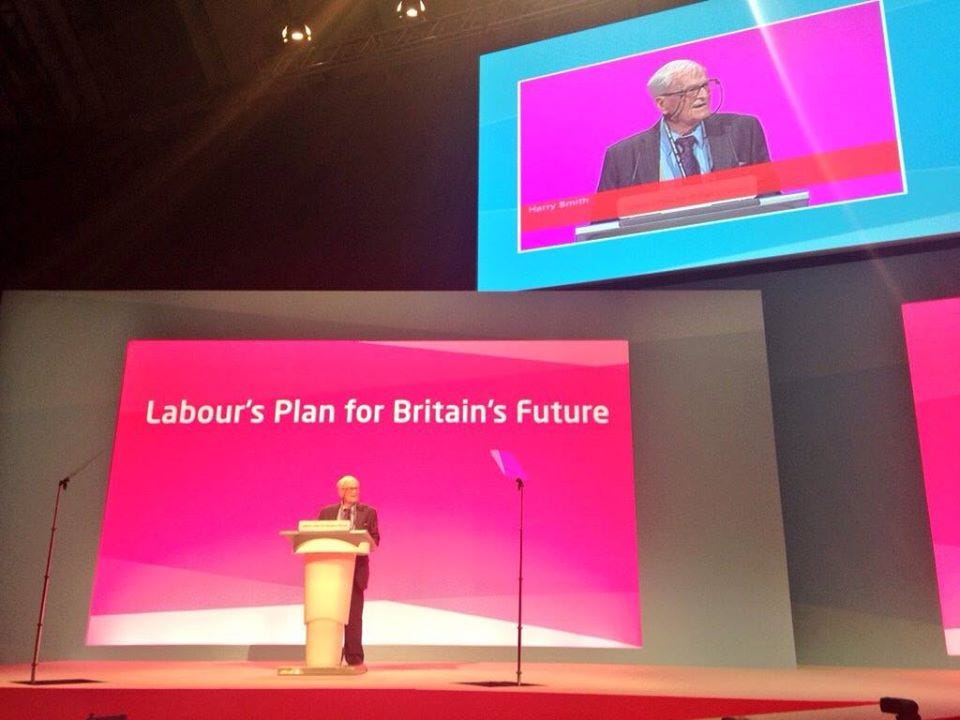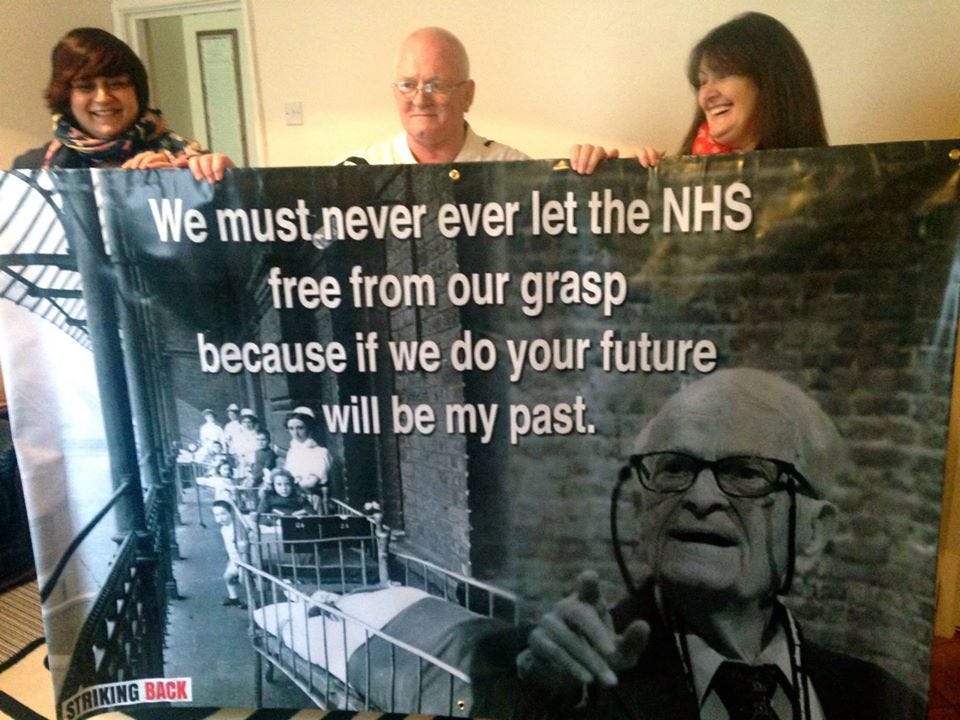Labour dropped the lines "the NHS is not for sale," from their 2024 general election manifesto. Doing so drenches any pledges by Labour that they will do better for public healthcare than the Tories with suspicion. I get the sense the NHS will be put up for sale by them and sold in parts like a butchered cow but where they will leave the tripe as free offerings to the poor.
For a political party that founded the NHS in 1948, Labour possess in 2024 a cynical disloyalty to the people. It is as cheap and feckless as a married man dropping his wedding ring in his pocket at the moment he joins a bunch of mates in Prague for a stag weekend.
Today’s reading from Harry Leslie Smith’s the Green and Pleasant Land is apt considering it deals with 1931 during the time when Britain didn’t have public healthcare and the working classes died with less care than dogs in the streets.
The Green & Pleasant Land was unfinished at the time of my dad’s death. I've been piecing it together from all the written notes, typescript & index cards my father left behind. It now has its own subfolder on this Substack because reading an excerpt here and there doesn't do it justice. The whole manuscript will be available in July before final revisions and its journey to a publisher.
It is a brilliant read and an important history of working-class life- during a time before the Welfare State. It is so important now that people own their working-class history because democracy in the 21st century has become more about giving the good life to its top-income earners at the expense of everyone else.
The Green And Pleasant Land:
Chapter Thirteen:
During the first week of 1931, Dad moved out of the doss house. He left quietly, without fuss or fanfare. Dad patted me on the shoulder and told me to be a good lad. And with that, my father slipped the moorings of our family and vanished from my life.
My father was the one who left, but it was my mother who deserted him. If the times had been kinder, the circumstances different, Mum would not have done what she did to my father. She wasn't a cruel woman, but the Great Depression hardened her like it calcified us all.
Forcing my dad to move out and exiling him from his children was a brutal punishment for the sin of becoming disabled at work and- because of it- unemployable.
It was a merciless time that only allowed for harsh solutions to survive.
Betraying dad allowed my sister and me to survive childhood during the dirty 30s. But it destroyed us as a family. It was a scar on our souls that didn't heal. It made us both love and loathe our mother throughout our youth and into middle age because she implicated us in the destruction of our dad.
But in 1931, there was no time for self-reflection. The year was more precarious and desperate than the previous ones faced by us and much of Britain's working classes. The shell shock from the economic collapse was now outright hopelessness. Anxiousness and desperation echoed across the laneways and cobbled streets of a famished Yorkshire.
There was so much pain ordinary people endured- financial, emotional and physical. But for the dying in Great Depression Britain, if they and their families didn't have the means to afford a doctor's care, their torment was inhuman. The sounds they made before death came to them have haunted me well into the 21st century.
It was unimaginable the torment the dying underwent during that long ago time before the NHS. I still remember the fearful din of those who approached death in 1931 if they were skint- and had no means to afford morphine to ease their passage to the grave.
Those poor wretches howled like animals dying at the roadside after being hit by a car. It was inhuman- those sounds. Yet the screams erupted everywhere that year in my neighbourhood.
I was terrified by these horrific shrieks which fell from open windows in my neighbourhood, or I heard from behind the shut doors at my doss. They were like the lament the priests from my school claimed the damned made as they burned in eternal hellfire. But this was not some god's punishment against human beings. It was the consequence of unmitigated capitalism, which condemned those too poor to afford medicine and relief, outside of gin, a miserable death.
When I questioned my mother about these noises. I was told.
"Someone is dying and making a racket about it."
I knew from witnessing Marion's death that if she could die at the age of 10, I could die at the age of 8. And should I perish- the months and days leading up to it would seem eternal in their agony.
The howling coming from people in pain who had no means to alleviate their suffering owing to their poverty could just as well be me or anyone in my family.
Every day and everywhere I walked- this dialect of moaning, yelling, cursing, and pleading the poor used before their end of life was present.
Sometimes, on my beer deliveries, I entered the rooms and squats of the dying. These people were in horrible shape with festering wounds or bed sores.
"Don't mind her, lad. She'll be soon off to a better place. But me- I am stuck here in this sorry place," one customer said after I brought beer into his up-one-one-down.
In 1931, our nation's poor, like in every other capitalist country, lived miserably and died in even greater misery. The unemployed of that year were a defeated army of millions vanquished by capitalism. When the factories, mills, and mines shuttered because Britain's exports dried up, no one came to help those people who had created vast profits for the entitled of our land before 1929. They were simply rubbish for the tip.
The government of the day- a so-called national one- with Ramsey Macdonald- a Labour PM at the helm- let us starve and then let us die.
My mother spent that year and every year after that until 1945 cursing Macdonald because he appeased the ruling classes at the expense of the workers. Mum believed that she had wasted her first vote as an emancipated woman when she cast it for "a bunch of bastards who dared to call themselves Labour."
In 1931, at just eight years old, I felt abandoned by my family and by England. I may as well have been a sailor- fallen overboard- who watched his ship steam off into the nothingness of a distant horizon. I was alone. And all around me was an open sea of poverty that stretched in every direction, past, present or future.
Thanks for reading and supporting my Substack. Your support keeps me housed and also allows me to preserve the legacy of Harry Leslie Smith. Right now until the Green and Pleasant Land is ready for a publisher and there is one interested-thinks are rather dire for me. A yearly subscriptions will cover much of next month’s rent. Your subscriptions are so important to my personal survival because like so many others who struggle to keep afloat, my survival is a precarious daily undertaking. The fight to keep going was made worse- thanks to getting cancer along with lung disease and other co- morbidities which makes life more difficult to combat in these cost of living crisis times. So if you can join with a paid subscription which is just 3.50 a month or a yearly subscription or a gift subscription. I promise the content is good, relevant and thoughtful. But if you can’t it all good too because I appreciate we are in the same boat. Take Care, John P.S there is a discount if you subscribe for this post.





Seems we still have a bunch of bastards calling themselves Labour 😞